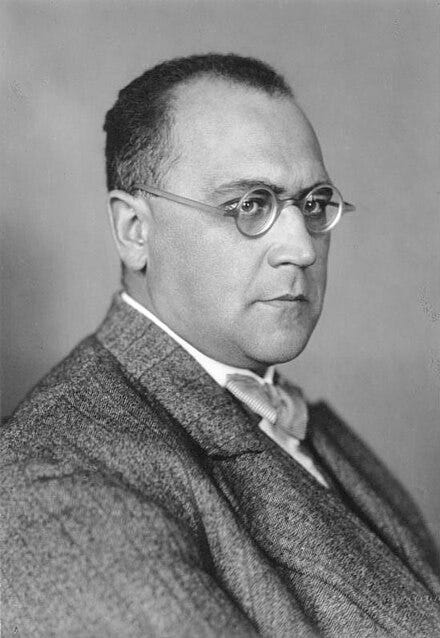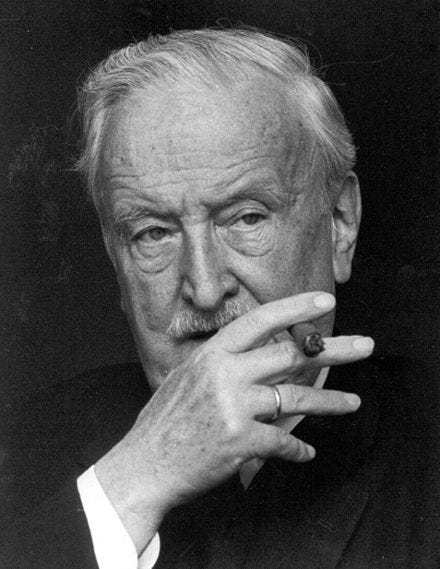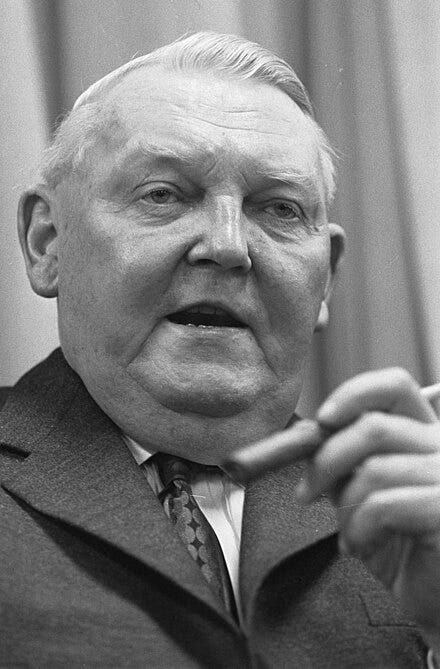10. The Old Guard's "Story of Politics Without Economics"
Did the American businessmen who decried decentralization as “economic principles quite new to the German mind" have a point? Was an Austrian economist telling the truth?
The American businessmen who—after a field trip to Germany chaperoned by the Economics Division—mustered the courage to issue an anonymous press release pushing back against decentralization policy in Germany were not entirely wrong in their assertion that decentralization was “new to the German mind.”
Recap: Germany’s hyper-concentrated death star economy fueled Hitler’s rise to power and the outbreak of WWII, so U.S. postwar policy prioritized economic decentralization in parallel with democratic political reforms. Yet on the ground, General William H. Draper, Jr. recruited bankers and big businessmen to run the “economic side of the occupation.” After the first two decentralization leaders resigned in frustration, an experienced investigator was brought in. Alas, forces both inside and outside military government were thwarting progress even though the military governor understood the importance of decentralization. Another Allied Power shared some blame for gridlocked negotiations. Then the midterm elections of 1946 shifted the balance of power domestically. But in the summer of 1947, two leaders abruptly departed Germany: the biggest roadblock to reform and the strongest advocate for it. Without them, would reform get back on course– or further derailed? It turns out a patent lawyer’s love life might have played a role.
Quite New to the German Mind?
Unlike the U.S., Germany had never adopted antitrust laws to counterbalance its rapid industrialization and the few restrictions it placed on cartel practices in the 1920s were rarely enforced. So economic decentralization, at least on the scale the Americans envisioned, would indeed have been “new to the German mind.”
Yet why propose this gatekeeping criteria—continuity with previous organizing principles of German society—just for this particular policy area? After all, the Allies were not exactly hesitant to enact other reforms to ensure a country that had already waged two world wars in half a century would not launch a third. The Allies had already resolved that Germany could not be permitted to simply revert to pre-Nazi laws and institutions, and ensured that “every amendment of [Germany’s new Constitution] and adoption of new laws” would be conditioned on their approval. Whatever would have been best in principle, in practice the opinions of German officials took on greater importance over time as budget cuts drove OMGUS to adopt a policy of “mak[ing] the Germans decartelize themselves.”
So what did German officials think? Some members of the old German establishment had learned nothing. James S. Martin recalled that when the exiled German ex-chancellor Heinrich Brüning gave a lecture in America in 1940, Brüning expressed a belated realization that there was a historical template for the forces that pushed him out of leadership: Thucydides’s classic history of the Pelopennisian War. Brüning had come to regret governing by emergency decrees that overrode the Reichstag and weakened the “equal protection of the law” and he acknowledged that “voluntary” agreements among business interests were futile in stemming “large-scale economic forces.” But Martin found that Brüning’s hindsight was still less than 20/20:1
“Even in the retelling, however, it seemed to me that Dr. Brüning again showed some of his former blindness. The main point in Thucydide’s history was the discovery of the large part that economic forces play in bringing nations into conflict. Yet, even when pressed by questions, Dr. Brüning showed no particular concern over the role of the large German industrial corporations. He related the entire story of Franz von Papen’s intrigues… without once alluding to von Papen’s conferences with the bankers and the Rhineland industrialists who agreed to back Hitler and who put up the funds. It was, throughout, a story of politics without economics: a story of a man who had felt that no harm could come from the temporary dictatorship so long as the laws and the courts protected civil rights, who showed no feeling for the ways in which great economic power and unlimited funds could get around an inconvenient legalism.”
The Economics Division, for its part, had managed to befriend any number of like-minded industrialists and economists. One such contact was Gustav Stolper, an Austrian economist2 who had served in the German Reichstag in 1930 before fleeing the Nazis. In early 1947, Stolper shepherded ex-President Herbert Hoover on a tour of Germany that was originally supposed to focus on food supplies, but somehow yielded a set of sweeping economic recommendations that happened to dovetail with the convictions of the Economics Division. Stolper later wrote that “the Americans in charge of antitrust in Germany seem to have acted under the illusion that the Germans themselves had never recognized the problem or done anything about it.” He disparaged the “young American lawyers in whose minds German history is a blank.”
In reality, the original proposals for dispersing economic concentration in Germany were drawn up not by “young American lawyers,” but by a subcommittee of the State Department’s Executive Committee on Economic Foreign Policy. Led by Dean Acheson, members included staffers from Thurman Arnold’s Antitrust Division, including Joseph Borkin, Sigmund Timberg, Corwin Edwards, and a German-Jewish lawyer named Heinrich Kronstein3 who worked as a judge and in private practice in Germany before emigrating in 1935 to the United States, where he became a law professor and served in the Antitrust Division.4 Kronstein testified before Congress:
“After the cartels were once established it could be quickly seen that the big industrialists inside the compulsory cartel had a more or less absolute leadership. Very often if not in most cases, the suspicion arose that the compulsory cartels were only made on the request of the big fellows because of the refusal of one or another of the small industrialists to join.”
The subcommittee issued two reports, in March and July 1945, which guided OMGUS.5 One stated: “the powerful domestic German cartels—and through them the big German combines—were the dominant factors in international cartels… Through them German firms were able to exercise monopoly control over large sectors of non-German industry—restricting output, controlling prices and technology.” Far from treating German history as a “blank,” as Stolper claimed, the report expressly repudiated Germany’s previous ineffective cartel laws.


The Economics Division also had connections with elements of the emerging German government. In May 1947—while decartelization chief James S. Martin was back in the USA on the verge of tendering his resignation—the Germans somehow happened to decide that decartelization work would be housed solely within their Ministry of Economics, rather than having any presence within their Ministry of Justice.6
The frustration of some German officials who were upset with their ongoing lack of sovereignty was succinctly reflected in a document that labeled a list of firms impacted by American deconcentration plans as “German economy outside of German influence.” Several German officials were later interviewed about their experiences with OMGUS. Dr. Otto Schniewind, Chairman of the Committee for West Germany’s Reconstruction Loan Corporation, was skeptical of the American view that hyper-consolidation was a bad policy choice that helped bring Hitler to power. He argued that the “concentration of manpower widely unknown in your country… [put Germany] in the position of facing the necessity of concentration of economic power, concentration of economic power aimed to use the human force of those millions of people concentrated in small areas in order not to split the power and to make a better and bigger use of it than could be done without such concentration.…[S]uch a high concentrated population as we had before 1939 and especially after 1945 has not enough room to establish free individual competition. Not everybody could do in that imagined competitive market what he liked. The highest effect could be reached only if this concentrated manpower could be used in concentrated economic forces.”
When asked about Law 56 specifically, Schniewind acknowledged that “there have been abuses of economic power in Germany,” but maintained that “the splitting up and deconcentration as foreseen in Law 56 is not in every direction useful for German economic conditions.” He did not view industry concentration as something readily useable by Hitler to foster a war economy, but rather emphasized that the individual “leaders of the industry were willing to go together with Hitler.” He supported deconcentration of Farben, but viewed the coal, iron, and steel industries as efficient.
Another official, Hermann Abs, Deputy Chair of the RLC also offered his opinions about Germany’s economy and prospects for reform. Abs was not exactly an impartial observer, having served on the board of Deutsche Bank—and its Farben oversight committee—during the Third Reich.7 However, Abs was cleared of wrongdoing after serving as a witness in the Nuremberg trials. Regarding the causes of Germany’s economic concentration, Abs explained that “the destruction of liquid funds through the period of inflation 1921-23 and during the crisis in 1931 led more than anything else to bring about larger units in Germany.” He pointed to United Steelworks, Farben, and big commercial banks like Deutsche Bank as examples. Abs similarly attributed the formation of cartels to inflation, but acknowledged that some industries did not become concentrated after the inflationary period of the 1920s. The textile industry, for example, retained a “sufficient amount of variety.” Meanwhile, “[i]n the cement industry the largest unit produces about 20% of the total” capacity, and cement cartels remained regional with some businesses that stayed independent; Nazi “efforts to bring about unified cartels for all Germany were not successful [due to] the opposition of the various companies who didn’t want to be just dependent manufacturers depending on one strong cartel.”
Abs thought that in the postwar economy where “any products can be sold either in the market for reconstruction, if it can be financed, or in the world market, one can very easily do away with cartels.” But he was “afraid that the time when a slump or a crisis should come up again the people will get together and try to find out how to defen[d] a certain industry against the effects of such a crisis.” Although he believed some cartels benefit “smaller and weaker manufacturers” and benefited consumers, he acknowledged that “in many instances” cartels were “abused by the larger, stronger manufacturers.” He agreed on banning cartels whose purpose was to “just to keep prices up” or eliminate international competition. Overall, “we should have a more competitive and freer economy and then watch carefully whether there are still either cartel organizations or some price agreements, etc. that should be examined.”
Abs also expressed concerns about how a transition to deconcentration would work. “[I]f one wants to aim at a certain policy of deconcentration, to put up separate units, there must be either a safeguard that each individual [coal mine] unit has a chance of working with a profit or without a loss, or someone is going to give some support, as this aim can only be reached after a certain period of years…”
A third German official was more amenable to official American policy. Ludwig Erhard’s background was in consumer market research but in 1944, he wrote a memo which caught the attention of U.S. authorities by predicting how losing the war might impact Germany’s finances. In March 1948, Erhard was elected Director of the Department of Economics by the Bizonal Economic Council.


The most pressing topic on Erhard’s mind was currency reform. Acting with American encouragement, in June 1948 Erhard introduced a new currency in West Germany: the Deutsche Mark. Then he took another leap without the blessing of the Allies by lifting price controls on many consumer goods in tandem with the currency reform. These actions were ultimately viewed as a success; the black market soon subsided and industrial production skyrocket from 50% of 1936 levels in June 1948 to nearly 80% by the end of the year. (However, the transition was not entirely smooth: a swift bout of inflation led to a general strike by the trade unions in November 1948.)
Erhard said that he was “absolutely positive towards the purpose of decartelization laws insofar as they hinder cartels and cartel-like trade practices,” but had a nuanced take on Germany’s cartels that varied by industry: “We have had cartels which had a good effect in the sense of establishing a sound market order. We had others which only sought to insure their market position.” What role did these groups play in the Nazi regime? Erhard thought that the existing cartels “formed the first point Hitler could grab to enforce and foster his plans. He took the cartels and organized them to the management links, committees, etc., to more closely and straighter organized bodies than he had before in those economic consumer goods cartels.” Erhard did not favor having cartels going forward, “because I regard cartels and the like practices as a medium for excluding a fair competitive market.”
As for deconcentration, Erhard distinguished between a “an economic firm which had developed itself in technical and economic steady development in a natural organic process” and a “group of concentrations founded purely out of reasons of economic power”—such as industrialist Hugo Stinnes’s coal and trading empire, which already boasted sixty subsidiaries by 1914. As examples of the former category, he named Bosch and Siemens, which in his view “had natural reasons [for growth] because of development of other technical processes of [the] enterprise. For instance, [television] developments or radio developments, or cinema developments, those matters have primarily not the intention of collecting economic power just to grow bigger and bigger, but the development was more natural.” By contrast, the association of steelworks “was a concentration of economic power by combining separate units just for the purpose of combining.” More generally, “[c]oncerns in the heavy industries had an absolutely different character from the concerns in the processing industries.”
Overall, “[b]etween the American and German opinions on decartelization and deconcentration,” he believed “there is no fundamental difference.” Yet Erhard also left the door open to the possibility that “research in effects and kind of decartelization laws in Germany may lead us to review of perhaps this or that paragraph of the law without altering the main and fundamental purpose.”
An Academic Revolution
What about academia? Most interwar German scholars and practitioners favored cartels– and influenced government commissions, courts, trade associations, and the Cartel Office accordingly. However, around the time Hitler took power, a small group of scholars far from Berlin, in the southwestern-most corner of Germany, started to lay the groundwork for a new school of economic thought. Some were fired or arrested because they were unwilling to cooperate with the Nazis. Some fled. After Hitler was defeated, the French Zone encompassed their university.
Who were these scholars? What did they believe? And what role did they—and Erhard—play in reforming Germany?
Stay tuned for the next installment…
Primary Sources
Several newly-scanned primary sources are relevant to today’s installment:
May 19, 1947 meeting summary (English translation) from German Laender Special Committee on Decartelization. Records decision to situate decartelization within Ministry of Economics, not the Ministry of Justice.
Testimony of German officials about decartelization (interviews conducted between Dec. 21, 1948 and Jan. 6, 1949).
Part of my goal with this project is to facilitate renewed scholarship into this era, so I plan to post more scans to Internet Archive— however, to minimize spoilers, I’ll wait to post some of them until later in the series. I’ll also provide a list of some excellent secondary sources.
Bold added to quote. Although Brüning had a reputation as the “I.G. Chancellor” because “the gentlemen of I.G. Farbenindustrie had got pretty much what they wanted under his administration,” in Martin’s assessment Brüning did not appear to be “a person likely to be influenced by or to have much influence with ‘big business.’” He had risen to power “from the post of Minister of Education, not from the board of the Deutsche Bank.” Thus, he was more like Woodrow Wilson, with a matching demeanor: a “combination of professorial bewilderment and amazed indignation at the way the world goes.”
Stolper was close with fellow Austrian economist Joseph Schumpeter, who later served as an academic advisor to Gustav’s son Wolfgang. The elder Stolper died in December 1947.
Kronstein converted to Roman Catholicism shortly after moving to the United States; “Catholic natural rights doctrine resonated with his deep conviction that immutable values had to be the foundation stone of a sound legal system and a just society.”
Kronstein also had an influential role in the development of U.S. antitrust law. He played a key role in preventing US antitrust law from being watered down in the 1940s, and in the 1950s wrote a textbook and a treatise that were widely reviewed. (One scholar estimated, however, that his works were cited by only six courts).
The subcommittee also developed proposals for international regulation of private monopolies and cartels, culminating in a 1944 draft cartel control agreement intended to be incorporated into the International Trade Organization Treaty which never came to fruition.
Even so, the first interim leader of the Decartelization Commission, Dr. Paul Josten, oversaw drafting of a German competition bill that—initially—mirrored the American-crafted bans on cartels and monopolies, much to the consternation of German industrialists.
Abs was cleared of wrongdoing after he served as a witness in the Nuremberg trials. Nonetheless, this background restricted his postwar influence to German domestic affairs, as the French would not tolerate Abs taking an official role in 1950s treaty negotiations.



